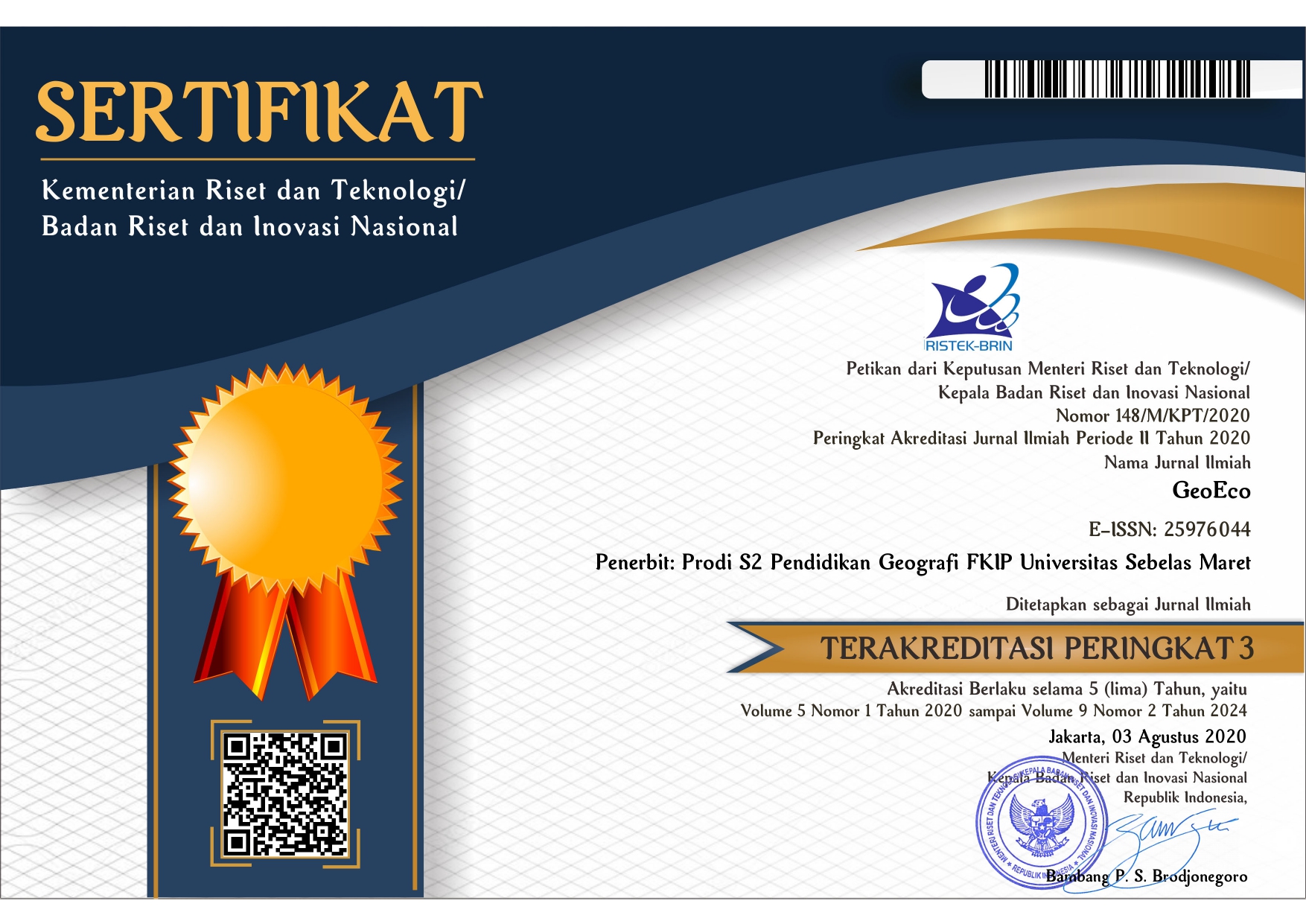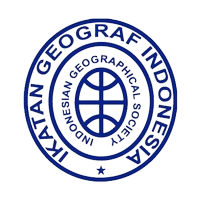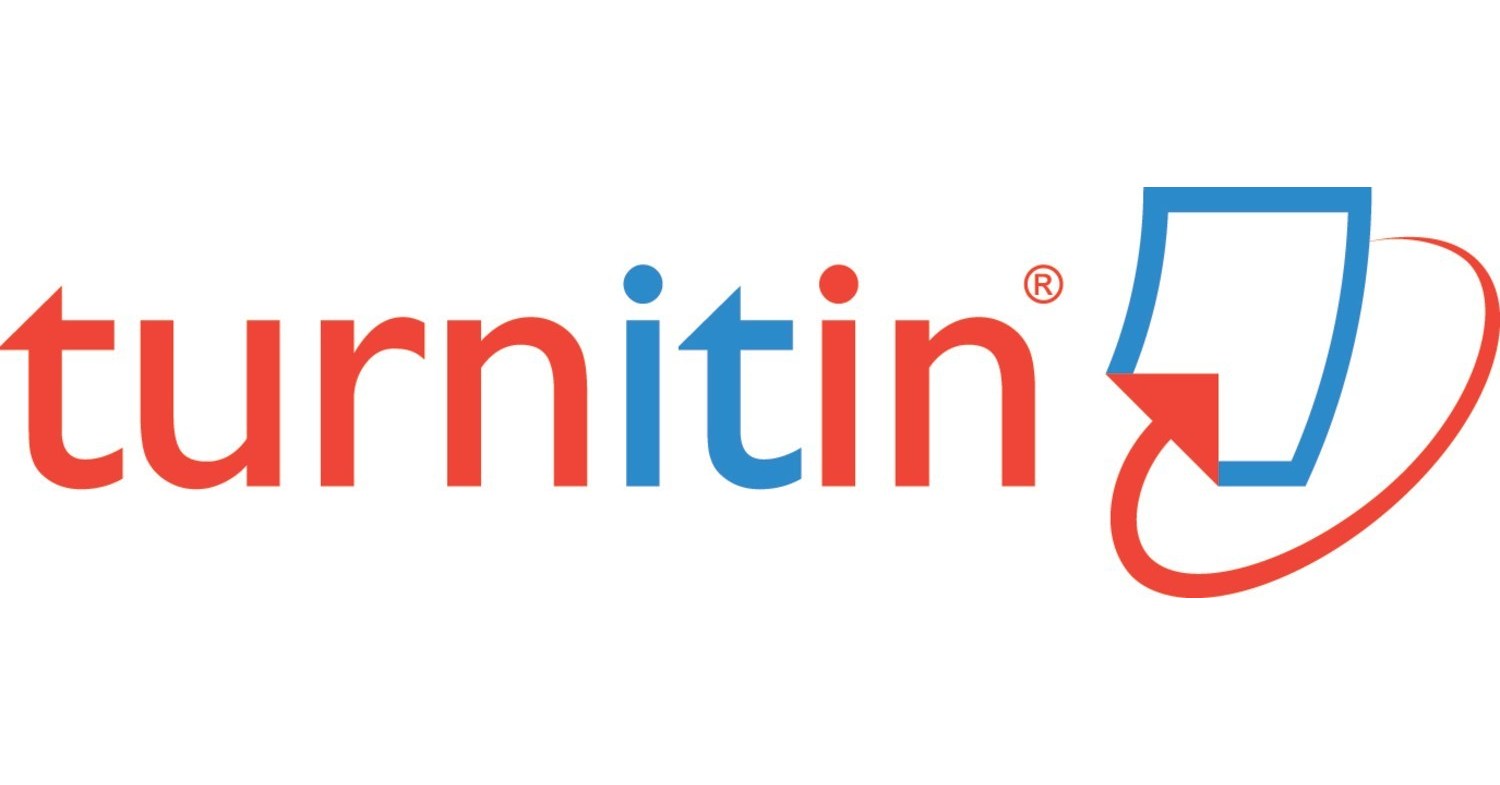INCREASING STUDENTS' CAPACITY IN FLOOD DISASTER THROUGH LEARNING WITH PROBLEM-BASED LEARNING MODEL WITH RELIGIOUS BEHAVIORISTIC APPROACH
Abstract
Keywords
Full Text:
PDFReferences
Aksa F. I. (2020). Islamic perspectives in disaster: An alternative to changing fatalistic attitudes. Jamb (Potchefstroom, South Africa), 12(1), 942. https://doi.org/10.4102/jamba.v12i1.942
Amstrong, David G. 1980. Social Studies In Secondary Education, Macmillan Pub. Co. New York.
Andari, I. A. K. M. L., Darsana, I. W., & Asri, A. S. (2019). Pengaruh Model Problem Based Learning (PBL) Berbasis Portofolio Terhadap Hasil Belajar IPS. International Journal of ElementaryEducation, 2(2), 70. https://doi.org/10.23887/jet.v2i2.16184
A’rachman, F. R., Setiawan, C., Hardi, O. S., Insani, N., Alicia, R. N., Fitriani, D., & Mozzata, A. N. (2024, March). Designing effective educational storymaps for flood disaster mitigation in the Ciliwung River Basin: An empirical study. In IOP Conference Series: Earth and Environmental Science (Vol. 1314, No. 1, p. 012082). IOP Publishing.
Ariyora, Y. K. S., Budisusanto, Y., & Prasasti, I. (2015). Pemanfaatan data penginderaan jauh dan SIG untuk analisa banjir (Studi Kasus: Banjir Provinsi Dki Jakarta). Geoid, 10(2), 137-146. http://dx.doi.org/10.12962/j24423998.v10i2.805
Banks, James, A And Cherry, A., Mc Gee Banks. 1999. Teaching Strategies For The Social Studies, Longman, New York.
Coburn, Aw, R.J.S. Spence Dan A. Pomonis, 1994, Mitigasi Bencana, Cambridge Architectural Research Limited, The Oast House, Malting Lane, Cambridge, United Kingdom
Degeng, I.N.S. 2006. Ilmu Pengajaran Taksonomi Variable. Jakarta: Depdikbud
Dewi, S., Sumarmi, S., & Amirudin, A. (2016). Penerapan Model Pembelajaran Problem Based Learning Untuk Meningkatkan Keaktifan Dan Keterampilan Sosial Siswa Kelas V Sdn Tangkil 01 Wlingi. Jurnal Pendidikan -Teori, Penelitian, Dan Pengembangan,1(3), 281–288. https://doi.org/10.17977/jp.v1i3.6148
Eka Purnamasari & Ahmad Darmadji. 2015. Problem-Based Learning (PBL) Model Of Religious Islamic Education To Improve Students’ Critical Thinking And Learning Outcomes Of Sma Sains Al-Qur'an (Quranic Science High School) Wahid Hasyim Yogyakarta. Yogyakarta: Universitas Islam Indonesia. https://dspace.uii.ac.id/handle/123456789/8380
F. Andriyani. 2015. Teori Belajar Behavioristik Dan Pandangan Islam Tentang Behavioristik. J. Pendidik. Dan Pranata Islam, Vol. 10, No. 2, Pp.165–180. https://doi.org/10.58223/syaikhuna.v6i2.1034
Gustavo Wilches, 1995, Bencana Dan Lingkungan, Program Pelatihan Manajemen Bencana, UNDP.
Hadi, A., & Sari, I. (2022). Implementasi Teori Belajar Behavioristik dalam Pembelajaran Pendidikan Agama Islam. Muaddib: Islamic Education Journal, 5(2),100-106. https://doi.org/10.19109/muaddib.v5i2.15145
Hamid Hassan, 1995, Pendidikan Ilmu Sosial, Jakarta : Dekdikbud Dikti- Proyek https://doi.org/10.23887/jjpgsd.v9i3.41099
Idris Moh. 2013. Pendidikan Agama Kontekstual:Studi Atas Pembelajaran Pai Di Sekolah. Jakarta: Uin Syarif Hidayatullah http://repository.uinjkt.ac.id/dspace/handle/123456789/49390
Kartini, I., Pohan, L. R., Lubis, P. A. A., & Toruan, S. M. L. (2024). Implementasi Problem Based Learning untuk Meningkatkan Pemahaman Konsep Siswa: Studi Pustaka. Ideguru: Jurnal Karya Ilmiah Guru, 9(1), 256-263. https://doi.org/10.51169/ideguru.v9i1.819
Mahadi, U. (2021). Komunikasi pendidikan (urgensi komunikasi efektif dalam proses pembelajaran). JOPPAS: Journal of Public Policy and Administration Silampari, 2(2), 80-90. https://doi.org/10.31539/joppa.v2i2.2385
Meilasari, S., & Yelianti, U. (2020). Kajian model pembelajaran problem based learning (pbl) dalam pembelajaran di sekolah. BIOEDUSAINS: Jurnal Pendidikan Biologi Dan Sains, 3(2), 195-207. https://doi.org/10.31539/bioedusains.v3i2.1849
Michalis, 1980, Social Studies For Children, New Jersey : Prentice Hall.
Muzani, S. C., Zid, M., & Akmal, F. M. (2020). Analysis Preparedness Level of the High School Community in Facing Earthquake and Tsunami in Lebak Regency of Banten Province. IOP Conference Series: Earth and Environmental Science,412(1)https://doi.org/10.1088/1755-1315/412/1/012014
Nanik Sulistya Wardani,D.(2012). Asesmen Pembelajaran Sd Bahan Belajar Mandiri.Salatiga: Widya Sari. http://eprints.umpo.ac.id/10893/
Novitasari, G. (2023). Pembiasaan Religius Pada Siswa MI Nurul Islam Wonogiri Perspektif Pendekatan Behavioristik. http://eprints.umpo.ac.id/10893/
Prahmana, M. (2024). Understanding Behavioristic Theory. Journal of Innovation in Teaching and Instructional Media, 4(2), 161-167. https://doi.org/10.52690/jitim.v4i2.754
Prananingrum, E. N., Setiawan, C., Afdan, N. T., Billa, S., & Wardana, M. W. (2023). Preparedness School Citizens of State Elementary School in Facing Flood through Digital Literation. MIMBAR PGSD Undiksha, 11(1), 140-147. https://doi.org/10.23887/jjpgsd.v11i1.51825
Putri, R. Y., & Hermon, D. (2025). Study Of Teacher Preparedness In Facing Flood Disasters At SMA N 1 Perhentian Raja Riau Province. GeoEco, 11(1), 188–205. https://doi.org/10.20961/ge.v11i1.96648
Ridhowati, A., Santosa, S., & Muryani, C. (2016). Aplikasiflash Macromedia Berbasis Problem Based Learning untuk Meningkatkan Pengetahuan Tentang Hidrosfer pada Mata Pelajaran Geografi. GeoEco, 2(1).
Sari, N. P., Budijanto, B., & Amiruddin, A. (2017). Pengaruh penerapan model pembelajaran problem based learning dipadu numbered heads together terhadap keterampilan metakognitif dan kemampuan berpikir kritis geografi siswa Sma (Doctoral dissertation, State University of Malang). https://dx.doi.org/10.17977/jptpp.v2i3.8720
Sarwedi Oemarmadi, “Pendidikan Dan Mitigasi Bencana Alam; Pelajaran Berharga Dari Aceh”, Homepage Pendidikan Network, Tanggal 2 Januari 2005.
Setyawan, M., & Koeswanti, H. D. (2021). Pembelajaran problem based learning terhadap berpikir kritis peserta didik sekolah dasar. Mimbar PGSD Undiksha, 9(3), 489-496.
Suharini, E., Meliana, D., Sanjoto, T., & Kurniawan, E. (2019, December). The Strategy of disaster mitigation literacy through problem-based learning (PBL) in the school prone to tidal floods. In Proceedings of the 1st International Conference on Environment and Sustainability Issues, ICESI 2019, 18-19 July 2019, Semarang, Central Java, Indonesia. http://dx.doi.org/10.4108/eai.18-7-2019.2290156
Sun, L., Deng, Y., & Qi, W. (2018). Two impact pathways from religious belief to public disaster response: Findings from a literature review. International Journal of Disaster Risk Reduction, 27, 588–595. doi:10.1 016/j.ijdrr.2017.10.004
Supiandi, M. I., & Julung,H. (2016). Pengaruh ModelProblem Based Learning (PBL) terhadap Kemampuan Memecahkan Masalah dan Hasil Belajar Kognitif Siswa Biologi SMA. JPS (Jurnal Pendidikan Sains), 4(2), 60–64. https://doi.org/10.17977/jps.v4i2.8183
Tyas, R. (2017). Kesulitan penerapan problem based learning dalam pembelajaran matematika. Jurnal Tecnoscienza, 2(1),43-52. Download.garuda.kemdikbud.go.id/article.php?article=1282974&val=17154&title=
Wahyuningtyas, R., & Kristin, F. (2021). Meta Analisis Penerapan Model Pembelajaran Problem Based Learning dalam Meningkatkan Motivasi Belajar. Mimbar PGSD Undiksha, 9(1),49-55. https://doi.org/10.23887/jjpgsd.v9i1.32676
Wijayanti, I., & Ekantini, A. (2023). Implementasi kurikulum merdeka pada pembelajaran ipas mi/sd. Pendas: Jurnal Ilmiah Pendidikan Dasar, 8(2), 2100-2112. https://journal.unpas.ac.id/index.php/pendas/article/view/9597
Wiyani & Irham. (2015). Psikologi Pendidikan Teori dan Aplikasi dalam Proses Pembelajaran. Jogjakarta: Arr-Ruzz Media. http://lib.iainpurwokerto.ac.id//index.php?p=show_detail&id=28035
Wulandari, F., & Koeswanti, H. D. (2021). Meta Analisis Penerapan Model Pembelajaran Problem Based Learning (PBL) Terhadap Motivasi Belajar Siswa Sekolah Dasar. Jurnal Pendidikan Tambusai, 5(2), 2841-2847. https://doi.org/10.31004/BASICEDU.V5I3.924
Yudin, F., Maâ, I., Hilmiyati, F., & Perdana, P. R. (2023). Penerapan Teori Belajar Behavioristik dalam Membentuk Karakter Religius Siswa Madrasah Ibtidaiyah Al-Muttaqin Gunungsari Kabupaten
Refbacks
- There are currently no refbacks.












.png)

